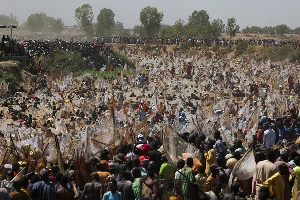The turning on of the valve by President Atta Mills on December 15, 2010 for official commercialization of Ghana’s oil also represented a different dimension of heightened expectations of oil gains. This expectation is for the country to transform its economy with the oil revenues. Avoiding state failures have, therefore, become the rhetorical stance of all actors in the oil story, and the range of prescriptions offered is legion. This is certainly to elude the resource curse. According to the report by the US Congressional Research Service titled “Ghana, an Emergent Oil Producer: Background and US Relations” written by Nicolas Cook, the jubilee field has “certified proven reserves” of 278 million barrels of oil (MMBO), but is widely believed contain significantly larger amounts of oil. With these potential oil reserves, the question dawns on whether or not oil wealth would propel economic growth.
Ghana appears to be remarkably ready in the face of challenges that beset oil-producing states. This assessment may, however, be a far cry from reality. The International Monetary Fund (IMF) has outlined five recommendations on prudent ways low-income countries can manage increased foreign aid flows. These recommendations can be made applicable to the oil and gas. This is because aid flows and oil flows are revenues that accrue to a state. Both are volatile and “depleting”. Whether or not the country is better prepared for prudent oil revenue management will depend on how it fares using the IMF recommendations as a yardstick.
The first has to do with minimizing the risks of Dutch Disease. One of the possible harms of an oil export boom is that the rise of oil earnings leads to increased public and private spending, which in turn leads to a sharp appreciation of the real exchange rate, and then to a decline in non-oil exports and a slower economic growth. This pattern has been referred the “Dutch Disease”. In minimizing the Dutch Disease, oil earnings are invested in ways to enhance productivity, and thereby raise rather than lower production in the non-oil traded good sector. This until years of exploration cannot be ascertained but Ghana should be careful.
The second is seeking to enhance growth in the short to medium term. This is where the oil earnings are invested in some high-return areas, such as improved food production, expanded infrastructure (roads, power and energy,) and increased educational outlays. Of particular concern is the development framework that will guide the direction of expenses from oil revenues.
The other has to do with the promotion of good governance and reduce corruption. This issue has to do with transparency and reliable public information on the sources and uses of oil earnings, and the expected flow of oil earnings in the future. This can be ensured by an enlightened civil society and informed public. The fourth is to prepare an exit strategy. There is no doubt the country has to prepare for the depletion of oil income flows. This is the reason why the agriculture sector should not be disregarded because of oil.
The last and not the least is to regularly reassess the appropriate policy mix. This border on setting out appropriate fiscal, monetary and exchange rate policies as a result of volatile oil earnings.
When a country is highly expectant of its oil revenues but without these provisions available, one should wonder if the country is making a fuss out of nothing. Are these expectations grounded in delusions considering that Ghana is not well ready for oil production? Ghana’s first oil has been sold on the international market while, as at the time of writing, the Petroleum Revenue Management Bill is still not passed into law. Oil companies are undertaking oil exploitation without Petroleum (Exploration and Production) law. Is Ghana therefore leaving in delusions of grandeur with these regulatory gaps? There are a lot of laid-down prescriptions that oil-producing can use to avoid the resource curse. Regardless of these prescriptions, most oil-producing states are still suffering from the realities of the resource curse. Why? It is a fact that these descriptions do not take into account a fundamental reality in most low-income oil-producing states including Ghana. As an integral part of the calculation to retain their political support, rulers are bent on distributing petrodollars to their friends, allies, and social support bases. Political leaders seem to believe they can ward off immediate political and economic problems by precisely distributing these revenues and as such to entrench their rule. This explains why many of the solutions proposed for overcoming the resource curse, though highly promising, are unlikely to work on their own. The nature of politics being witnessed today can never offer the best antidote to eliminating the anomalies that are inherent in the oil sector. The truth be told.
For these prescriptions to be effective, they should rest upon credible and adequate information, monitoring and participation generated by an environment suffused with respect for rights as well as the consent of the population. The two recommendations of the IMF I would admonish Ghana to adopt as, a sense of urgency are that of ensuring good governance and corruption. There is no doubt Ghana is weak in these factors alluded to. The case for a written development strategy is legitimate. Development framework soothes the destructive nature of volatile spending associated with oil revenues. A coherent development framework generates abatement to self-centered dream of short term political pressures to expend that would benefit the few. Whether or not the Ghana Shared Growth and Development Agenda (GSGDA) was design to cater for investments of oil revenues and guide the direction of oil flows remain a dicey situation. The belief is that transparency is the essential first step in a multidimensional strategy to counteract the resource curse. There is little point in talking about collaterization and reducing acute poverty using oil revenues when governments do not even provide the basic information on oil for the public. Despite promised disclosure of contracts in March 2009 by the president, it is surprising why contracts with extractive companies remain sacred and secret.
When a country’s oil is in delusions of grandeur one should wonder if the scattered examples of destructive nature of oil exploitation in several countries serves no lessons. It goes without saying that Ghana is not better placed to avoid the worst manifestations of the resource curse. There is luxury of time for the country to make amends. It may seem too early to assess the strength of the country in ensuring prudent oil revenue management. But issues of good governance, transparency and civil society and public engagement start right from the discovery to exploitation to production of oil. Far from being a seemingly hopeless venture, Ghana’s oil - with its immense wealth - may well be the next frontier of roaring cognitive pragmatism towards poverty reduction and economic growth. This is bound to happen only when the international best practices on transparency and revenue management are treated with urgency. The sixty-four thousand dollar question is will these potential oil reserves translate into any meaningful development or they are all delusions of grandeur.
The author, Stephen Yeboah is the National Coordinator for Osagyefo Network for Rural Development (OSNERD), an NGO based in Kumasi. (email: stephenyeboah110@yahoo.com)
Opinions of Thursday, 10 February 2011
Columnist: Yeboah, Stephen














